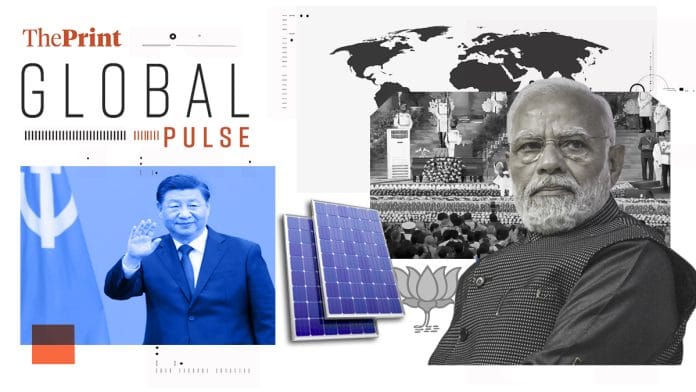New Delhi: A “humbled” and “emotional” Narendra Modi Sunday took oath as the Prime Minister for the third term and will now face a “challenge of governing differently”, correspondents Hari Kumar and Mujib Mashal write in a New York Times report.
Pointing out that the coalition leaders were “swarmed by TV crews while on their way to present demands and policy opinions” to the PM and that Modi’s opponents have been “getting more airtime”, their report claims that Modi’s “messianic air is gone”.
Modi’s “shift in approach can mean only good things for the country’s democracy — a move toward moderation in a hugely diverse nation that was being whipped into a Hindu-first monolith in the image of one man”, the report holds. However, it also questions whether Modi “can truly become something he has not been during his two-plus decades in elected office: a consensus builder”.
The Economist, in its new podcast series ‘The Modi Raj’ hosted by correspondent Avantika Chilkoti, brings together audio of Modi’s speeches, interviews and what has been said about him from various sources such as ANI, Legend Global Studios, filmmaker Lalit Vachani, Prasar Bharti archives, Desh Gujarat, The New York Times, NDTV, Doordarshan, and the BBC.
The first episode, released this weekend, chronicles Modi’s rise from the son of a “chaiwala” to the Chief Minister of Gujarat, according to his Bollywood biopic. “Hard work, shrewd diplomacy and sheer luck” brought him to Delhi where he was a Bharatiya Janata Party (BJP) TV spokesman before being given the responsibility of Gujarat where the party was in “tatters” after the 2001 earthquake over allegations of “clumsy management and corruption”, the podcast says. “To make Gujarat great again, they got this person who had never held an elected office before.”
In its report — ‘India’s climate dilemma will hang over Modi’s next five years‘, Bloomberg tries to map the new government’s climate agenda. “Modi, who has cast himself as climate champion for much of the past decade, will be under pressure to make faster progress toward existing green targets,” write journalists Rajesh Kumar Singh and Lou Del Bello.
With India’s growing energy demand remaining unfulfilled despite a significant expansion in clean energy, the report presents the challenges of steep investment requirements for infrastructure changes aimed towards a green transition. However, noting the advantages of a coalition government, it says, “One potential change for the next five years will be the role of local parties, which may ease centralization and bring regional interests up the agenda, climate analysts and researchers said — and that includes spreading green manufacturing and clean energy benefits.”
A Global Times opinion piece by Xie Chao, associate professor at the Institute of International Studies, Fudan University, analyses India-China relations over the last decade and its future. From the “multiple adjustments, from engagement to confrontation, and then to easing tensions for closer economic cooperation” in Modi’s first five years to then making the “border standoff with China a salient issue in his second term”, the author invokes Modi’s Newsweek interview in April to predict only “cautious changes” in his third term.
Calling India’s relations with the US “consistent with Hindu nationalist aspirations for India’s status as a major power”, Xie says, “How the US balances ideological differences with India and utilizes India as a vanguard against China will, to some extent, determine the direction of India-China relations.” Xie, however, notes the “resilience” of economic ties between the two Asian giants, saying that “blind confrontations serve neither side’s interests”.
Snap polls in France soon, Israel war cabinet minister resigns
Marine Le-Pens’s far-right party emerging victorious by a huge margin in European Parliament elections has forced France’s President Emmanuel Macron to announce a snap general election. Read The Guardian’s explainer to know more.
Benny Gantz, Israel’s war cabinet minister, Sunday resigned from the Netanyahu-led emergency government. Signalling divisions over post-war plans for Gaza, Gantz has called on the Israel PM to set a date for elections. Read the BBC report to know more.
(Edited by Madhurita Goswami)
Also read: China claims to build a community at Shangri-La, then threatens Taiwan with ‘destruction’






